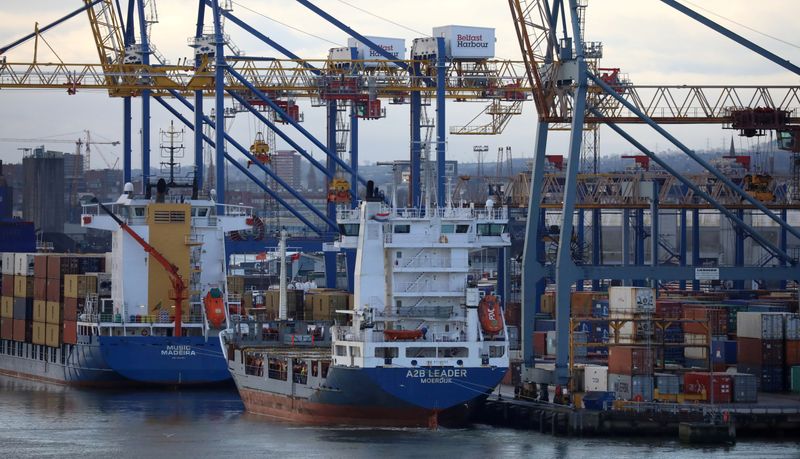By Conor Humphries and William James
DUBLIN/LONDON (Reuters) - The European Union on Wednesday appeared to rebuff a British demand for an extended grace period for Brexit checks on goods going from Britain to Northern Ireland, with a senior official saying recent issues could be resolved under the current deal.
Britain earlier demanded a two-year extension to the grace period, raising the stakes in a row that threatens to reopen the rift that bedevilled years of Brexit talks.
"I really think that if all the flexibilities we put on the table and into the protocol would be used to the maximum that all of the issues which we are discussing today would be really resolved," Commission Vice President Maros Sefcovic told RTE television.
The comments came after a meeting between Sefcovic and British Cabinet Office minister Michael Gove, who made the extension demands in a letter earlier on Wednesday.
Another politician present at the meeting, Northern Ireland's Deputy First Minister Michelle O'Neill, said Sefcovic told Gove the protocol must be implemented in its entirety.
"He said that the EU expects rigorous implementation of the protocol," O'Neill told RTE after the meeting.
The UK government had no immediate comment.
The meeting to discuss how to ease the passage of goods across the customs border between Britain and Northern Ireland was called after shortages and delivery disruptions sparked anger in the British-ruled region.
A month after it quit the EU's orbit, Britain wants changes to the rules it agreed for Northern Ireland, which it left behind in the EU's single market and customs union.
Those rules ensure no checks on goods crossing the land border between Ireland and Northern Ireland, but mean checks are now needed on goods arriving from other parts of the United Kingdom.
Authorities in Northern Ireland complain that the new rules have already led to difficulty bringing in goods from other parts of the United Kingdom and shortages in supermarkets.
The rules are due to get even tighter when a three-month grace period for some goods expires.
In his letter to Sefcovic, Grove said the grace period "must be extended until at least 1 January 2023".

"If it is not possible to agree a way forward in the way we propose, then the UK will consider using all instruments at its disposal," he added, saying that what was needed were "political, not technical, solutions".